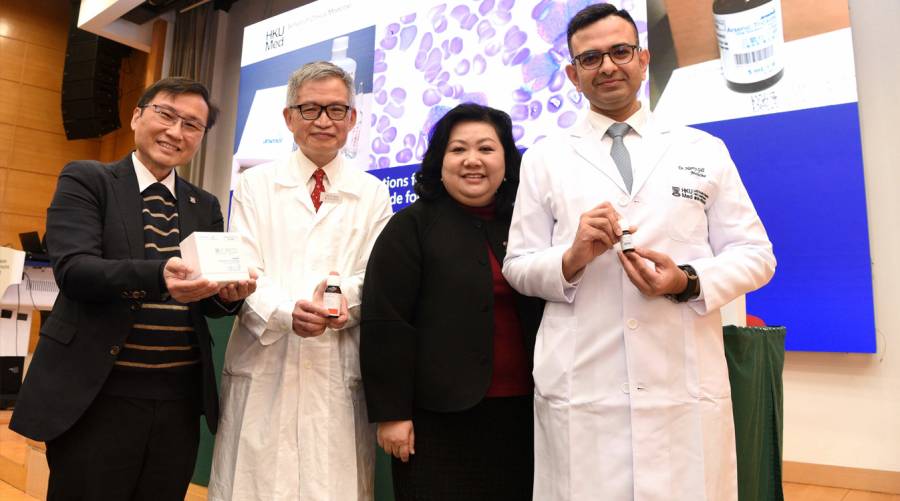How a breakthrough Hong Kong invention is transforming Leukemia treatment
HKUMed’s Oral Arsenic Trioxide achieves 97% cure rate for Acute Promyelocytic Leukemia

Researchers at the LKS Faculty of Medicine, University of Hong Kong (HKUMed), have developed Oral Arsenic Trioxide (Oral-ATO; ARSENOL®)—a revolutionary treatment for acute promyelocytic leukemia (APL), a highly fatal form of blood cancer. This groundbreaking invention is the first prescription medicine fully developed and manufactured in Hong Kong, marking a historic milestone in global medical advancements.

The leukaemia survivor Ms Wong (second right) shared her experience using oral-ATO in combating cancer.
After more than two decades of research, the HKUMed team successfully integrated Oral-ATO into clinical treatment plans, achieving a 97% overall survival rate for APL patients. Unlike traditional therapies, Oral-ATO reduces treatment-related complications, eliminates the need for bone marrow transplants in most cases, and significantly improves patient outcomes.
Game-Changing Results for Leukemia Patients
HKUMed’s research journey involved multiple clinical studies demonstrating the effectiveness of Oral-ATO:
- A 15-year study on 400 relapsed APL patients showed a 100% molecular remission rate and an 80% five-year survival rate—without bone marrow transplantation.
In newly diagnosed APL patients, Oral-ATO achieved 100% survival and leukemia-free rates at five years. - A new fully oral treatment regimen (AAA: Oral-ATO + all-trans retinoic acid (ATRA) + ascorbic acid) is currently being tested in Hong Kong, allowing APL patients to receive outpatient treatment with fewer side effects.
Global Recognition: FDA and EMA Designations
Oral-ATO has gained orphan drug designation (ODD) from the U.S. Food and Drug Administration (FDA) and the European Medicines Agency (EMA)—a crucial step toward international adoption. Additionally, the U.S. FDA granted investigational new drug (IND) designation, paving the way for global clinical trials.
Expanding Access Through the APL Asian Consortium
The APL Asian Consortium, led by HKUMed, unites researchers from Hong Kong, Malaysia, Singapore, and Taiwan to promote Oral-ATO use across Asia. Clinical trials have already proven its superiority over conventional chemotherapy-based treatments.
In China’s Greater Bay Area (GBA), Oral-ATO has been approved by the Guangdong Provincial Medical Products Administration (GDMPA) for clinical use at HKU-Shenzhen Hospital. The medication is also available for clinical research in Singapore, Malaysia, and Taiwan.
International Collaboration in the UK, USA, and Europe
- In the United Kingdom, the UK AML Research Network and Cardiff University have secured funding from Blood Cancer UK for a nationwide Phase 3 trial of Oral-ATO as a frontline APL treatment.
- In North America and Europe, Oral-ATO will undergo large-scale clinical trials with industry partners, supported by FDA and EMA designations.
APL: A Curable Disease
Dr. Harinder Gill, Clinical Associate Professor at HKUMed and lead investigator of the study, emphasized the impact of this breakthrough:
“Oral-ATO is a game-changer for APL patients worldwide. It provides an effective, safer, and more accessible treatment, transforming APL into a curable disease. Our mission is to make this life-saving therapy available to patients everywhere.”
Advertisement
Trending
Popular
Broccoli sprout compound may help lower blood sugar in prediabetes, ...
-
Gas Pain vs. Heart Attack: How to tell ...
09:00 PM, 22 Feb, 2025 -
Coconut oil supplement shows promise ...
08:00 PM, 20 Feb, 2025 -
Normal vitamin B12 levels may still ...
05:00 PM, 19 Feb, 2025 -
Revolutionizing Genomic research: The ...
02:00 PM, 19 Feb, 2025



